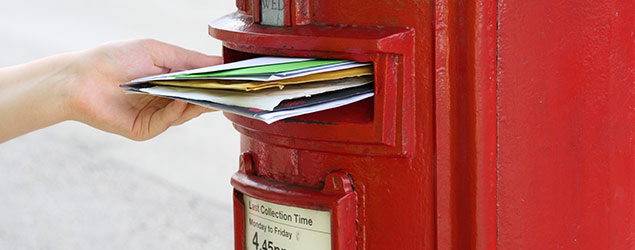
Royal Mail sell-off 'cost British taxpayer millions'
Taxpayers lost out due to the Government's low valuation of Royal Mail shares during its privatisation, finds the National Audit Office. 'Sold off on the cheap' »
The Prime Minister has defended the Royal Mail sell-off, claiming it has been good for the taxpayer, despite a report saying the public purse had lost out.
David Cameron said the sale had benefited the taxpayer in three ways: it had generated money for the country, the Royal Mail was now a "profit-making company paying taxes into the Exchequer" and Britain had a successful business.The Government has robustly defended the sale against sharp criticism from the National Audit Office, which found that "deep caution" shown by ministers when pricing shares in the Royal Mail last year cost the taxpayer more than £1bn.
Shadow business secretary Chuka Umunna branded the sale a "first-class disaster" and "botched privatisation" before demanding an apology.
Vince Cable responded in the House of Commons by saying the "last thing" he intended to do was apologise for the Government's undervaluation of the Royal Mail.
The Business Secretary said the Government was right to take a "cautious" approach to the sale and had it not done so it would have put taxpayers' interests at risk.
Royal Mail shares were listed at 330p each and on the first day of trading alone, Royal Mail's new shareholders benefited to the tune of £750m - money which could have gone to public funds. Today they were trading at 565p.
Mr Cable said: "The last thing I intend to do is apologise. What I do intend to do is to refer to what the report actually said as opposed to the spinning and the froth that is being generated around me."
He said: "A more aggressive approach to pricing would have introduced significantly greater risk and the advice that we received in this respect was unambiguous.
"There was no confidence that a sufficient number of buyers would offer a significantly higher price, a failed transaction and retention of the Royal Mail in public ownership would have been a very poor outcome for the taxpayer as the NAO report confirms."

The NAO report concluded the Business department should not have relied so heavily on their City advisers, while the Public Accounts Committee chairwoman Margaret Hodge accused Mr Cable's department of being "clueless".
The Government sold £2bn of shares in October, amounting to 60% of the company, and favoured priority investors such as Standard Life, Fidelity and BlackRock hoping they would be long-term investors.
In the event, the 16 priority investors sold all or some of their holdings, making a significant profit, within the first few weeks of trading.
Amyas Morse, head of the NAO, said: "The department was very keen to achieve its objective of selling Royal Mail and was successful in getting the company listed on the FTSE 100. Its approach, however, was marked by deep caution, the price of which was borne by the taxpayer.
"The Government retained 30% of the company. It could have retained even more and allowed the taxpayer to participate further in the rapidly increasing share price and thus limit the cost to the taxpayer."
The report does, however, say the Business Secretary was right to reject bankers' gold-plated valuations of Royal Mail of more than £9bn.
Critics of the sale have seized on the axing of 1,300 jobs and a hike in stamp prices in recent days as evidence of the folly of privatisation.
Unite national officer Brian Scott said: "This report is startling proof that the Government sold off the country's family silver on the cheap."
Some 10% of Royal Mail was handed free to employees during the privatisation.
Taxpayers were left with a 30% stake that is now worth around £1.6bn.
Article from : https://uk.finance.yahoo.com/news/royal-mail-sell-off-cost-taxpayer-millions-021847441.html?vp=1

總理已經捍衛了英國皇家郵政拋售,聲稱它已經好納稅人,儘管有報告稱公共財政已經失去了。
卡梅倫表示,出售了三種方式的納稅人受益:它產生了錢,為國家,皇家郵政已成為一個“牟利的公司,繳納稅款入國庫”和英國有一個成功的企業。
政府已有力辯護,對來自國家審計署,結果發現,由部長股定價在英國皇家郵政在去年的時候顯示“深小心”花費納稅人超過10億英鎊的尖銳批評的銷售。
影子商務大臣竹卡Umunna要求他道歉之前,品牌的銷售是“一流的災難”和“拙劣的私有化” 。
文斯電纜回應在下議院說的“最後一件事” ,他打算做的是道歉的英國皇家郵政的政府低估。
商務大臣表示,政府有權採取“謹慎”的方式來銷售,並沒有這樣做,因此將不得不把納稅人的利益處於危險之中。
英國皇家郵政股份在上市330P每對單獨交易的第一天,英國皇家郵政的新股東受益於7.5億英鎊的曲調 - 錢,可以去公共資金。今天,他們被交易565P 。
電纜先生說: “過去的事情我打算做的是道歉什麼我不打算做的,是指什麼樣的報告居然說,相對於紡紗和正在我身邊所產生的泡沫。 ”
他說: “一個更積極的方式來定價將引入顯著更大的風險,而我們在這方面得到的意見是明確的。
“有沒有信心,購房者有足夠數量將提供一個顯著更高的價格皇家郵政的,一個失敗的交易,並瀦留在公有製本來是為納稅人一個非常貧窮的結果作為NAO報告證實。 ”
國家審計署報告的結論業務部門不應該過於依賴他們的城市的顧問,而政府帳目委員會女主席瑪格麗特霍奇指責為“無能”電纜先生的部門。
政府在十月出售股份的20億英鎊,佔本公司60 % ,並贊成優先投資者,如標準人壽,信誠和貝萊德希望他們會是長期投資者。
在事件中, 16個優先級投資者出售其所持全部或部分,作出顯著利潤,在最初幾週的交易範圍內。
Amyas莫爾斯,國家審計署負責人說:“該部門是非常敏銳的達到銷售皇家郵政的目標,並成功地獲得在金融時報100指數的上市公司,其方法,但是,被打上了深刻的謹慎,價格其中承擔了由納稅人。
“政府保留了公司的30%,它可能保留甚至更多,讓納稅人進一步迅速增長的股價參與,從而限制了成本的納稅人。 ”
該報告確實,但是,說商務秘書是有權拒收銀行家“鍍金皇家郵政的估值超過90億英鎊。
出售的批評者在最近幾天抓住的1,300個工作崗位的砍,並在郵票價格上漲私有化的愚蠢的證據。
團結國家官員布賴恩·斯科特說: “這份報告是驚人的證明,政府拋售該國的家當就便宜。 ”
英國皇家郵政的部分10 %的私有化過程中遞給免費給員工。
納稅人留下了30%的股份,現在是價值約16億英鎊。
沒有留言:
張貼留言